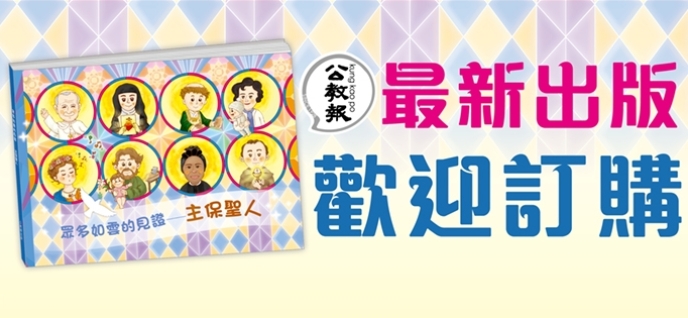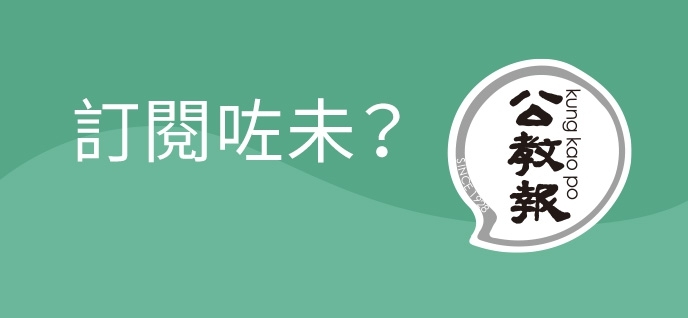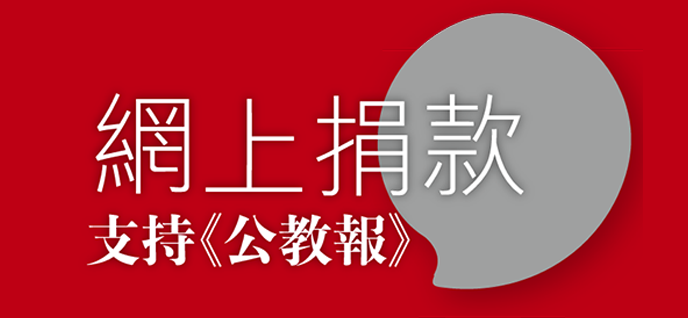昔日文章
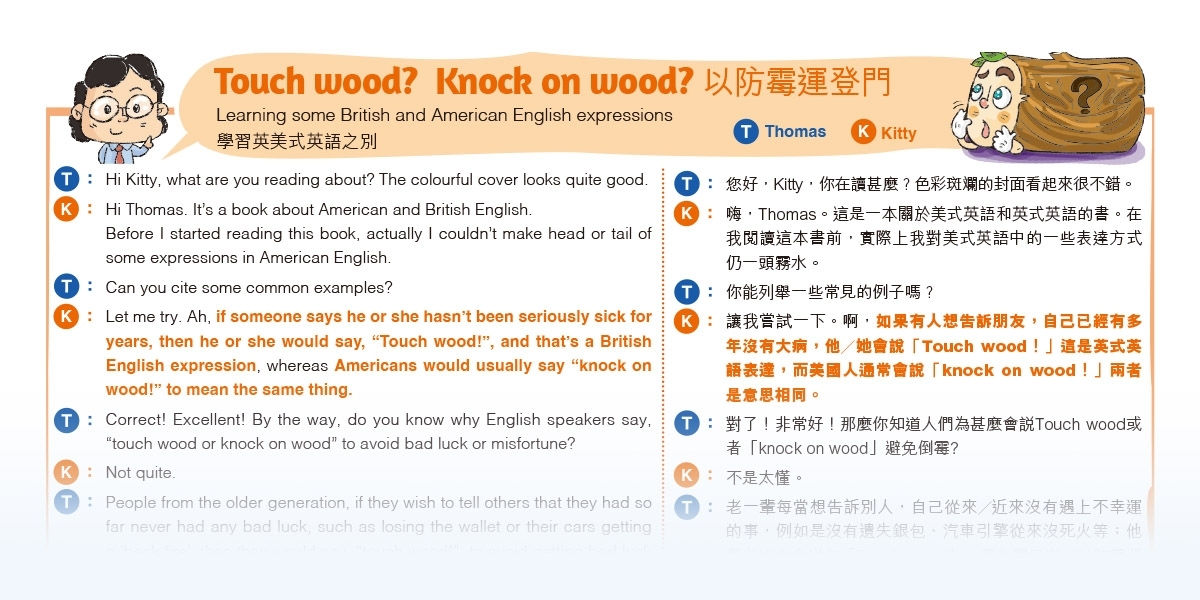

Learning English with Thomas
2023.02.19
Touch wood? Knock on wood?
以防霉運登門
Learning some British and American English expressions
學習英美式英語之別
T: Thomas J: Kitty
T : Hi Kitty, what are you reading about? The colourful cover looks quite good.
K : Hi Thomas. It’s a book about American and British English.
Before I started reading this book, actually I couldn’t make head or tail of some expressions in American English.
T : Can you cite some common examples?
K : Let me try. Ah, if someone says he or she hasn’t been seriously sick for years, then he or she would say, “Touch wood!”, and that’s a British English expression, whereas Americans would usually say “knock on wood!” to mean the same thing.
T : Correct! Excellent! By the way, do you know why English speakers say, “touch wood or knock on wood” to avoid bad luck or misfortune?
K : Not quite.
T : People from the older generation, if they wish to tell others that they had so far never had any bad luck, such as losing the wallet or their cars getting a ‘back fire’, then they would say, “touch wood!”, to avoid getting bad luck that may be just around the corner waiting for them.
K : I see.
T : As a matter of fact, there is also a similar usage in Chinese, namely, “toi-lai”, meaning literally. “relying under the protection of external force”.
K : That’s very interesting. (Thomas nodding smilingly)
T : 您好,Kitty,你在讀甚麼?色彩斑斕的封面看起來很不錯。
K : 嗨,Thomas。這是一本關於美式英語和英式英語的書。在我閱讀這本書前,實際上我對美式英語中的一些表達方式仍一頭霧水。
T : 你能列舉一些常見的例子嗎?
K : 讓我嘗試一下。啊,如果有人想告訴朋友,自己已經有多年沒有大病,他╱ 她會說「Touch wood!」這是英式英語表達,而美國人通常會說「knock on wood!」兩者是意思相同。
T : 對了!非常好!那麼你知道人們為甚麼會說Touch wood或者「knock on wood」避免倒霉?
K : 不是太懂。
T : 老一輩每當想告訴別人,自己從來╱近來沒有遇上不幸運的事,例如是沒有遺失銀包、汽車引擎從來沒死火等;他們之後也會說句「Touch wood」,避免開口中,以防霉運登門。
K : 原來如此。
T : 其實,中文也有類似用法, 例如「托賴」,意思是指有賴於外力保護。
K : 這很有趣。(Thomas 微笑點頭)
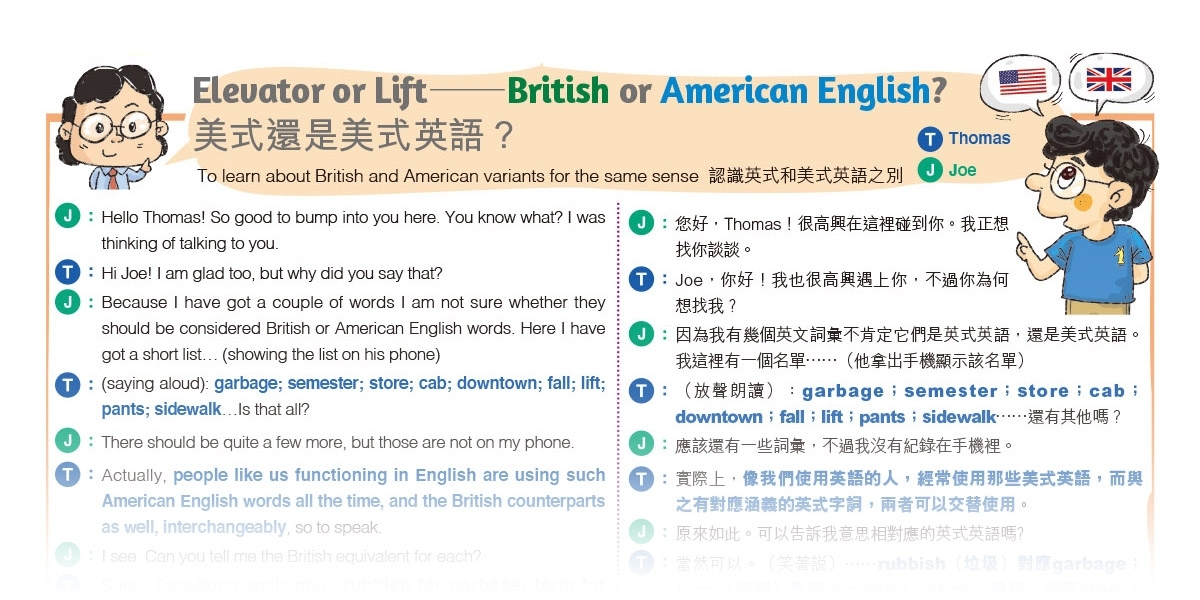

Learning English with Thomas
2022.11.27
Elevator or Lift —— British or American English?
美式還是美式英語?
To learn about British and American variants for the same sense 認識英式和美式英語之別
T : Thomas J : Joe
J : Hello Thomas! So good to bump into you here. You know what? I was thinking of talking to you.
T : Hi Joe! I am glad too, but why did you say that?
J : Because I have got a couple of words I am not sure whether they should be considered British or American English words. Here I have got a short list… (showing the list on his phone)
T : (saying aloud): garbage; semester; store; cab; downtown; fall; lift; pants; sidewalk…Is that all?
J : There should be quite a few more, but those are not on my phone.
T : Actually, people like us functioning in English are using such American English words all the time, and the British counterparts as well, interchangeably, so to speak.
J : I see. Can you tell me the British equivalent for each?
T : Sure…(speaking smilingly)…rubbish for garbage; term for semester; shop for store; taxi for cab; town centre for downtown; autumn for fall; elevator for lift; trousers for pants; and pavement for sidewalk.
J : That’s another lesson for me today. Shall we go for lunch together?
J : 您好,Thomas!很高興在這裡碰到你。我正想找你談談。
T : Joe,你好!我也很高興遇上你,不過你為何想找我?
J : 因為我有幾個英文詞彙不肯定它們是英式英語,還是美式英語。我這裡有一個名單……(他拿出手機顯示該名單)
T :(放聲朗讀):garbage;semester;store;cab; downtown;fall;lift;pants;sidewalk……還有其他嗎?
J : 應該還有一些詞彙,不過我沒有紀錄在手機裡。
T : 實際上,像我們使用英語的人,經常使用那些美式英語,而與之有對應涵義的英式字詞,兩者可以交替使用。
J : 原來如此。可以告訴我意思相對應的英式英語嗎﹖
T : 當然可以。(笑著說)……rubbish(垃圾)對應garbage; term(學期)對應semester;shop(商店)對應store; taxi(計程車)對應cab;town centre(市中心)對應downtown;autumn(秋天)對應fall;elevator(升降機) 對應 lift;trousers(長褲)對應 pants;and pavement(行人路)對應 sidewalk.
J : 今天又上了一課。不如我們一起吃午餐?


Stories Behind Popular Sayings
2022.06.12
Pocket money
There are always debates about whether parents should give their children pocket money, at what age should children be given pocket money, and how much to give. While pocket money gives children the chance to buy things which make them happy, parents are more concerned that their children should learn money management.
The word " pocket " comes from the Old French word " poke " , meaning " pouch " or " sack " . Several centuries ago, it was used as a measure of quantity in agriculture, for example, a pocket of wool. Before pockets began to be sewn into men's clothes in the 17th century in Europe, people used various kinds of pouches to keep their valuables. They hid a pouch under their clothes or fastened it around their waist.
When the expression " pocket money " first appeared in the 17th century, it meant a small amount of money carried in the pocket for minor expenses, not especially for children.
Eventually, it came to mean an amount of money that parents regularly give to their children to spend on their own. This British expression is called "allowance " in the USA.
人們經常爭論:父母應否給子女零用錢(pocket money)?兒童應該在甚麼年齡獲得零用錢?父母應該給多少零用錢?雖然零用錢讓兒童有機會買到令自己開心的東西,但是父母更關注的是,子女應當學習金錢管理。
英語「pocket」一字來自古法語poke,意即小袋或袋。數世紀前,它被用作農業的數量單位,例如一袋羊毛。在17世紀歐洲男士衣服縫上口袋之前,人們用各種各樣的小袋來存放貴重物品。他們把小袋藏在自己的衣服下面或扣緊在自己的腰部上。
當「pocket money」這個詞語首次在17世紀出現的時候,它的意思是放在隨身攜帶的小袋裡的小量金錢,用作小額開支,並非特別為兒童。
漸漸地,pocket money開始解作父母定期給子女的金錢,讓他們自行決定如何花錢。這個英式英語在美國被稱為「allowance」。


Stories Behind Popular Sayings
2021.11.05
Sweep something under the carpet
An artwork called " Sweep it Under the Carpet " appeared on a wall in London in around 2006. The mural, created by the famous graffiti artist Banksy, shows a maid who is sweeping some dust under the cover of a brick wall like a curtain. Banksy's creation is said to criticise the Western countries of ignoring global issues such as poverty.
The phrase " sweep something under the carpet " first appeared in the mid-20th century, much earlier than Banksy's work. Its origin is related to housecleaning. Instead of getting a dust pan or removing the dirt into a rubbish bin, a maid or a housewife sweeps the dirt under a carpet. By doing so, she thinks that she can hide the problem. As it is a bit lazy to sweep something under the carpet, this expression always carries a negative tone.
The idiom means to conceal something because it is unpleasant or embarrassing to deal with. For example:
The conference urged the world leaders not to sweep the climate change issue under thecarpet.
" Carpet " is more common in British English, whereas " rug " is used more in American English.
一件題為Sweep it Under the Carpet的藝術品約於2006年出現在倫敦的一堵牆上。這幅由著名塗鴉藝術家班克斯所創作的壁畫展示,一個女僕正在把一些塵埃掃向一塊像簾幕的磚牆覆蓋物下面。班克斯的創作據說是批評西方國家漠視全球問題,例如貧窮。
Sweep something under the carpet這個語句,最初是在20世紀中旬出現,比班克斯的作品更早。它的起源與房屋打掃有關。女僕或家庭主婦不但不用簸箕或把灰塵掃進垃圾箱裡,反而把灰塵掃到地毯下面去。這樣一來,她以為自己能夠把問題掩藏起來。因為把東西掃到地毯下面是有點懶惰,所以這個說法往往含有負面語調。
這個習語的意思是把東西隱藏起來,因為應對它是令人不快或尷尬的事情。例如:
大會促請世界領袖不要把氣候變化問題掩蓋起來(sweep... under the carpet)。
Carpet在英式英語中比較普遍,而rug則在美式英語中較常用。
捐款支持公教報 http://kkp.org.hk/donation



